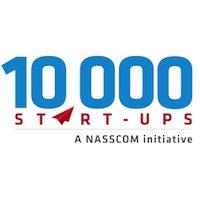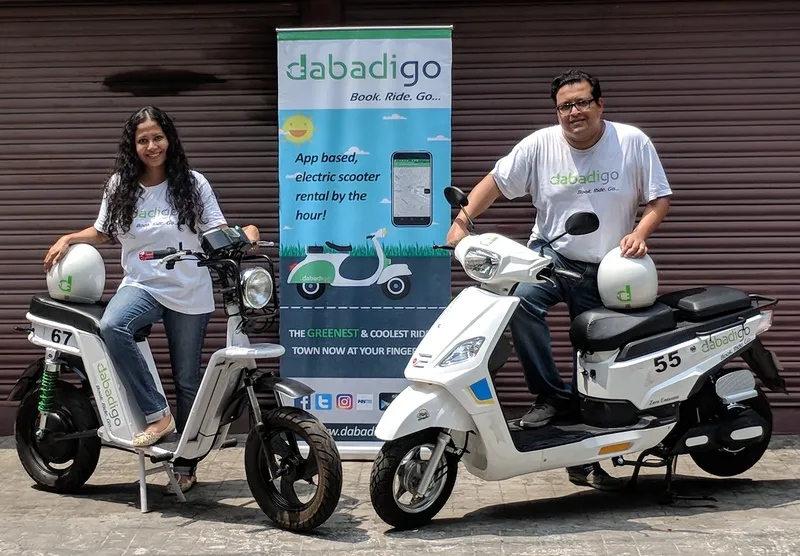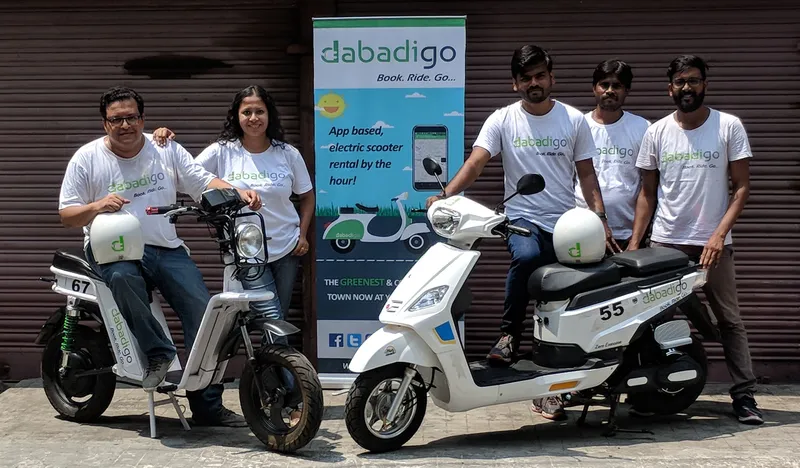
Nasscom 10 000 Start-ups
View Brand PublisherKolkata-based dabadigo is combating pollution while enabling last-mile connectivity
In December 2015, Delhi’s pollution levels had reached alarming highs and the state government had introduced the odd-even scheme to help combat the crisis. Kolkata-based Basabjeet (Jijo) Nag was with friends and a discussion ensued in which some of them said that while they were okay with this scheme and with taking public transport, they were not happy with the fact that there was no service to help with last-mile connectivity. “This got me thinking about why we couldn’t create something that would provide green transportation and could be shared and made available to everyone at an affordable cost,” he says.

That spark of an idea led to the beginning of dabadigo, a rental service for electric scooters that didn’t require a license to operate and could be dropped off and picked up from any location within a city.
The inspiration for the name dabadigo came from a lot closer to home. “My one-and-a-half year-old son would look at scooters from the balcony and yell “dabadigo!” I was struck by how catchy the name sounded, and that’s what we decided to name our company,” says Jijo, who is the Co-founder along with his wife Reshmi Nath. Reshmi specialises in technology, marketing and product management, while Jijo’s forte lies in operations and product development.
Over the next few months, they started working on an app and launched a proof of concept (PoC) in December 2016. It could not have a happened at a more appropriate time. In January 2017, Greenpeace published a report which showed that over 1.2 million people in India die each year from pollution alone.
That same month, dabadigo started operations in Kolkata with six scooters. They currently have a fleet of 65 Hero Electric scooters with plans to increase to 150 scooters over the next three months.
Connectivity with a conscience
In addition to being a completely eco-friendly emission-free solution, dabadigo is one of India’s first app-based, cloud-monitored, self-drive, by-the-hour electric scooter rental services. A customer has to download the app, which helps them locate the nearest pick-up point, book an e-scooter and drive it to their desired destination anywhere within the city. “Once they are done, they can just drop the scooter off at any of our locations and payments can be made via Paytm, credit card or cash. Our smart e-scooters are cloud monitored and come with complimentary helmets, insurance and roadside assistance,” says Jijo.
“Cloud monitoring also helps to ensure customer and vehicle safety. We can remotely locate a vehicle, diagnose basic vehicle health and remotely turn off a vehicle, if needed. Our app allows riders to send their live trip information to friends and family to ensure their safety.”
Speaking about their growing customer base, Jijo says, “Our key customers can be broadly segmented into two groups – B2C and B2B. Our B2C customers mainly include college students, young professionals and out of towners and our B2B segment mainly consists of sales professionals and hyper-local delivery businesses.”
He says they provide their B2C customers all the advantages and convenience of having their own vehicle at a fraction of the cost, and their B2B customers an on demand, trackable, scalable fleet as and when they need it. “Furthermore, we are providing a green and clean mode of transportation to our country, which will alleviate a lot of problems associated with pollution and will take us one small step closer to attaining the Government of India’s Electric Mobility Vision 2030,” he adds.
He says they are also driven by memorable customer experiences. “One such incident involved two out-of-towners who were visiting Kolkata from Europe. One night, right before closing as our staff was taking stock of all our overnight rentals, they noticed that the vehicle rented by this couple didn’t have enough battery for them to go back to their hotel from a party they were at. Normally, in case of overnight rentals, the customers are responsible for charging the vehicles after hours. However, since they were non-Hindi/Bengali speakers we wanted to make sure they were okay. We tried calling them a few times but couldn’t get through. In the meantime, we sent one of our flying squad executive to them with a spare battery. By the time we got through to them, our flying squad was already there and within minutes, the battery was changed. The couple was beyond happy with this service since they had forgotten to check the battery and would have had no way to charge the scooter at midnight when the party ended.”
A simple and scalable solution
dabadigo currently has multiple rental points across the city and customers can pick up and drop off scooters from any of these points. “While we currently own all our rental points, in future we have plans to have a hybrid model where some of the points will be owned by dabadigo, and some will be owned by franchisees,” says Jijo.
They also have expansion plans and dabadigo wants to increase its operations to five cities and have a fleet of 1,000 vehicles by the end of this year. “IoT and cloud technology plays a major role in our vision for dabadigo. We already have technology that will allow us to run completely unmanned rental points. We are also investing in developing our own fleet of smart scooters that will help us run even more advanced precision diagnostics on the vehicles remotely,” says Jijo.

The dabadigo team currently has 11 members including the founders, core management, flying squad and rental point executives.
From a global perspective, India still has a lot of room for growth in this space. “Global point-to-point transportation has really taken off in United States, Europe and China with VCs backing those ventures. In India, a few companies have started venturing into this space. Since the market opportunity is huge in our country, in the next two-three years, we expect major scale up in India with the help of marquee investors,” says Jijo.
“Our extremely loyal customer base has also helped us scale, and most of our growth has been through word of mouth and reference from our customers. We believe our commitment to product quality, customer safety, transparency and superior service has earned us this loyalty.”
But there have been challenges along the way. One of the key challenges for the electric vehicle market is the lack of a developed charging infrastructure in the country. “To combat that, all our scooters come with swappable batteries and each rental point doubles as a battery swapping station.”
One thing that has helped is an early mover advantage. “Currently there are no major competitors in India, but it is bound to happen in future. We want to establish dabadigo as a brand that will be known for its superior technology and exemplary customer service; a brand that our customers can trust. That, I feel, will be our main differentiator that will help us stay ahead of competition in future,” says Jijo.
Driven by inspiration
“I have drawn a lot of inspiration from the life of MS Dhoni and have admired his journey from a small-town boy to the greatest champion in modern cricket history. When MSD decided to quit his job as a ticket collector with the Indian Railways in Kharagpur, he told his father that if he was to worry about job security, he would not be able to go far in life. I also firmly believe that if one has an idea that one believes in strongly, he or she should fully focus on it and go ahead,”
High school sweethearts Jijo and Reshmi, who both hold degrees in business administration from Michigan State University and share a love for thin crust pizza, had successful careers in the US and in India, working with Fortune 100 companies like Sun Microsystems and Motorola, when they decided to pursue their dream to be entrepreneurs. They say that one of the biggest advantages they’ve had is their association with the NASSCOM 10,000 Startups programme.
“We started our PoC in November 2016 and in December 2016 we got the best startup award at Infocom 2016. Soon after, we were chosen to participate in the NASSCOM 10,000 Startups programme. By June 2017, we were chosen as one of East India’s top 30 startups by NASSCOM 10,000 Startups and were part of their Kolkata Warehouse programme. By this time, we had already started talking to various investors. In September 2017, we were chosen by CNN as one of India’s top 24 startups and were featured on television in December 2017. We were also invited to be a part of Times of India’s Brand Shoots accelerator programme. All of this helped us secure seed funding from a few private investors.
Getting selected for the NASSCOM 10,000 Startups programme was a great help for us in terms of connecting with other startups and building credibility in front of investors,” concludes Jijo.







